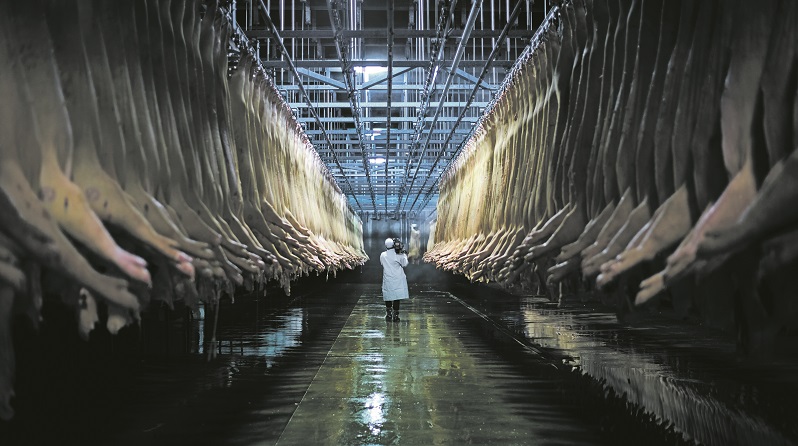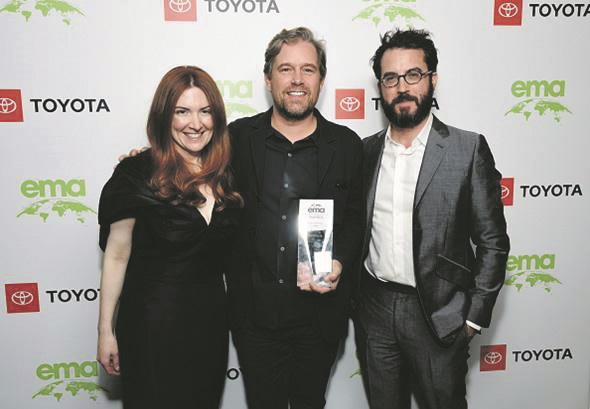Eating Animals author Jonathan Safran Foer: ‘Never has man eaten so much meat’
Jonathan Safran Foer's book on the devastating effects of factory farming has been turned into an award-winning documentary narrated by Natalie Portman
The next time you tuck into a burger, grab a schwarma or sit down for Friday night dinner, it might be worth considering where your meat came from – or indeed, as Jonathan Safran Foer questions, if something has gone horribly awry with the food industry.
Best known for his novels, including the besteller Everything Is Illuminated and his most recent book, Here I Am, the 42-year-old took a detour from fiction for his 2009 book, Eating Animals, which examines how society’s increasing hunger for meat has resulted in a catastrophic effect on the environment and the farming industry as a whole.
Now his book has been turned into an award-winning documentary, which is directed by Christopher Quinn and narrated by actress Natalie Portman, and is released in UK cinemas on Friday.
Get The Jewish News Daily Edition by email and never miss our top stories Free Sign Up
From images of floating dead fish in polluted, lurid water, to obese animals, overcrowded livestock and disease, the documentary makes for uncomfortable viewing about factory farming in the United States, which accounts for 55 billion animals – or a staggering 99 percent of the meat eaten – every year.
As Portman’s narrative tell us: “Today’s chickens have been bred with mutant obese genes to grow faster and fatter than ever imaginable before.”
Despite its stark warnings and shocking facts, Safran Foer insists the film is not “a philosophical question on whether it’s right to eat meat”, but rather, “a very practical question in the year 2019 about whether agriculture of today is doing things right”.
He credits that sense of justice about how we treat animals to his Jewish upbringing, which he says taught him there was “nothing more fundamental than the valuing of life”.
He adds: “I am capable of distinguishing between the lives of humans and animals, but not dismissing the lives of animals. It’s hard to imagine a person who feels the lives of animals are totally unimportant to them.
“The laws of kashrut, as I was taught them, emphasised the ethical component of respect to animals. Caring about how we eat, recognising food as a choice, that there are cruel and less cruel ways of slaughtering animals, was very much a part of my Jewish education.”

Safran Foer grew up eating meat, but began to question his food preferences after becoming a father.
“We read bedtime stories that have animals as heroes and we have pets we are taught to treat a certain way,” he explains. “We even sleep with stu ffed animals to give us comfort and yet there’s this other thing we do that’s not in keeping with this.
“For me, this discomfort never went away and when my son was about to be born, I faced the prospect of having to make food choices for someone else. I felt an urgency I hadn’t felt before and began questioning what was important to me.”
So began his journey into discovering more about where meat comes from – and the hefty price society is now paying, having discovered technologies that allow production on a scale never seen before in history.
But he also discovered the agricultural industry was particularly secretive about its practices and found it near-impossible to access any farms.
With no options left, Safran Foer joined a group of animal activists late at night and illegally accessed farms to see the stark reality for himself.
He says: “This industry is particularly abusive and it’s kept from sight. If I wanted to see how my car was made, it wouldn’t be that hard to get access to the facility. If I wanted to see how my breakfast bagel was made, it wouldn’t be hard to go behind the counter and see the equipment – but if you wanted to see where your meat comes from, you’re out of luck.”
Depicted as abusive, harmful and secretive, mass farming methods are certainly condemned by the film, but what of its necessity in making food more available and affordable?

“What we consume today is an historically unprecedented amount of meat. Our eating habits have been transformed by factory farming and the fast food industry.
“When we eat 180 times more chicken per person than we did a century ago, it’s because so much is eaten with the fingers of one hand while driving – something our parents and grandparents would never have done.”
What is the solution? The rise of plant-based food companies and imitation meat may be one way to counter factory farming, but the real answer for Safran Foer is much simpler.
“Our biggest problem is our need to eat meat” he says. “We don’t need to become radical, we need to become more conservative, to revert to farming methods of the past and enjoy meat as a delicacy, like we used to, with our families around
the table.”
Eating Animals (12A) is released in cinemas on Friday. Details: eatinganimals.co.uk/screenings

Thank you for helping to make Jewish News the leading source of news and opinion for the UK Jewish community. Today we're asking for your invaluable help to continue putting our community first in everything we do.
For as little as £5 a month you can help sustain the vital work we do in celebrating and standing up for Jewish life in Britain.
Jewish News holds our community together and keeps us connected. Like a synagogue, it’s where people turn to feel part of something bigger. It also proudly shows the rest of Britain the vibrancy and rich culture of modern Jewish life.
You can make a quick and easy one-off or monthly contribution of £5, £10, £20 or any other sum you’re comfortable with.
100% of your donation will help us continue celebrating our community, in all its dynamic diversity...
Engaging
Being a community platform means so much more than producing a newspaper and website. One of our proudest roles is media partnering with our invaluable charities to amplify the outstanding work they do to help us all.
Celebrating
There’s no shortage of oys in the world but Jewish News takes every opportunity to celebrate the joys too, through projects like Night of Heroes, 40 Under 40 and other compelling countdowns that make the community kvell with pride.
Pioneering
In the first collaboration between media outlets from different faiths, Jewish News worked with British Muslim TV and Church Times to produce a list of young activists leading the way on interfaith understanding.
Campaigning
Royal Mail issued a stamp honouring Holocaust hero Sir Nicholas Winton after a Jewish News campaign attracted more than 100,000 backers. Jewish Newsalso produces special editions of the paper highlighting pressing issues including mental health and Holocaust remembrance.
Easy access
In an age when news is readily accessible, Jewish News provides high-quality content free online and offline, removing any financial barriers to connecting people.
Voice of our community to wider society
The Jewish News team regularly appears on TV, radio and on the pages of the national press to comment on stories about the Jewish community. Easy access to the paper on the streets of London also means Jewish News provides an invaluable window into the community for the country at large.
We hope you agree all this is worth preserving.
-
By Brigit Grant
-
By Laurent Vaughan - Senior Associate (Bishop & Sewell Solicitors)
-
By Laurent Vaughan - Senior Associate (Bishop & Sewell Solicitors)
-
By Laurent Vaughan - Senior Associate (Bishop & Sewell Solicitors)
-
By Laurent Vaughan - Senior Associate (Bishop & Sewell Solicitors)





















